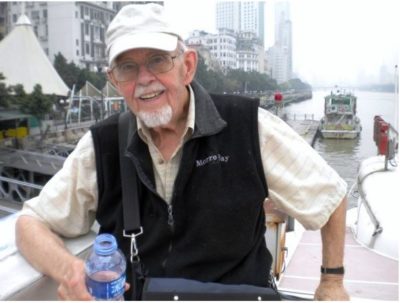The difference between a career and a calling, according to John Guy LaPlante, is that a career occupies your time until you retire. It can be satisfactory and pleasant, but after you retire, you never do it again and you never think about it again. “When you have a calling, you do it until your last breath,” LaPlante says.
John’s calling is effecting change for the better, and he continues to strive for a better world as his 88th birthday approaches. When John was 77, he felt a calling to join the Peace Corps.
It began when John saw a concert given by a Coast Guard Academy band. After seeing so many servicemen in the audience, he felt bad having never served in the armed forces. Afterward, John said he read an article about a Peace Corps initiative to recruit senior volunteers for their wisdom, experience, and desire to give back. He met with a recruiter in Los Angeles, and — after telling his family about his somewhat zany plan — he started the yearlong process of completing the necessary paperwork and medical exams.
John speaks with a thick New England accent from spending most of his life in Massachusetts and Connecticut, but his first language was French, taught to him by his Québécois parents. John figured the Peace Corps would send him to a country where his bilingualism would be valuable — Haiti, Vietnam, maybe Northern Africa. These locations also suited his aversion to the cold; John was escaping to Southern California each winter to avoid Connecticut’s harsh weather.
He was surprised to learn he was being sent to Ukraine and needed to learn Russian. John attended daily Russian classes, and he even began waking at 4 a.m. to study before his lessons. “I was the worst Russian student the Peace Corps has ever had,” he said. “I would study at night and forget the words in the morning because I was so damn old.” He was admitted to the program nonetheless.

Just 50 miles east of Chernobyl lies Chernihiv, Ukraine, where John was assigned to teach English at a state language school. Chernihiv was no Newport Beach; the winter chill was cruel and the living standards dissimilar. He was perturbed by a young boy in his first host family who seemed to suffer a disability that rendered him unable to attend school. John connected with him and lamented that his situation was not a rare one. John was stirred to improve the lives of Chernihiv’s citizenry in any way he could.
John became a regular at the local Korolenko Library. After sensing the enthusiasm of his English students at the school, he took it upon himself to lead an English Club — soon followed by a French Club — at the library on Sunday evenings. He tutored young people one-on-one and became invested in a mission to foster their interest in reading. This proved difficult, however, in a library with no digital catalogue of its contents.
Each Peace Corps volunteer is responsible for creating and leading a project of some significance apart from their service responsibilities, and it was at the library that John got an idea for his personal project: He developed a system to digitally organize the materials of the multi-building library campus. His ambitious plan was met with some resistance by nervous librarians who feared losing their positions to such a database, but John assured them their jobs were safe.
If reorganizing the library’s database wasn’t enough, John also noticed that the complicated, multi-tiered system of buses, trains, and trolleys lacked an inclusive guide, so he made it his mission to develop one. He worked with the municipality to establish a self-sustaining directory with keys, schedules, and a visual map that still exists today in print and online.
John’s successes in the program were considerable, but he noted — usually with the phrase “jeepers creepers!” — that he experienced hardships and setbacks as well.
One winter night, as he walked to a marshrutka (small bus) station in Chernihiv, LaPlante was inadvertently caught up in a drunken couple’s argument over their last bottle of beer, and he was knocked off the sidewalk and into the road. As he lay there, dazed, a police car pulled up and the Chernihiv Militsiya approached him. “They thought I was drunk!” he said. “Probably because of my terrible Russian.” It was imperative for John to convince the officers of his sobriety since excessive drinking can be cause for disciplinary action in the Peace Corps. Only after he could produce the necessary paperwork did they believe his story and offer him a ride home.
In another instance, John’s passion for teaching his students landed him in the Dean’s office when he went off-book for his lessons. He devised exercises to teach his students American English when he felt the required textbook’s British English was inappropriate. “I thought I was doing a superior job!” he offered. His supervisor, however, urged him to follow the text more closely.
Despite his troublemaker tendencies and atrocious Russian, LaPlante was never ousted from the program as he feared he would be. In fact, he received a call from the director of Peace Corps, who informed him that, at 80 years old, he was currently the oldest Peace Corps volunteer in the world. “I asked what had happened to my predecessor,” John said, “and she said, ‘Oh, that guy had to be medically evacuated.’”
As John’s Peace Corps service neared its end, he wished to leave a final, lasting impression on the program that would rouse unity and morale in its members: an anthem. John recalled the galvanizing tunes of the military service branches that stirred in him a desire to be involved in such an institution, and he envisioned a similar song for the Peace Corps. Despite his efforts to coordinate lyricists and composers — including a plan for a selection jury — John’s call for an anthem fell on deaf ears at the Peace Corps. “They just couldn’t understand the beauty of it,” he said.
John still sings the praises of the Peace Corps, if not literally. In 2011, adding to his other travel books, he self-published 27 Months in the Peace Corps: My Story, Unvarnished, a book about his experiences as a Peace Corps volunteer.
When John speaks with others about his experience, people often tell him they contemplate serving, and he always responds, “It’s not too late.”
John blogs about his life and travels on his website, www.johnguylaplante.com.
Become a Saturday Evening Post member and enjoy unlimited access. Subscribe now




Comments
John LaPlante is the true Renaissance man. With a successful career behind him and opportunities to indulge his wildest whims, he seeks pursuits of adventure and philanthropy–one never knows which is more compelling. He has the wonder and energy of a person half his age. He writes about his experiences with both acuity and humor. The Post article captures his personality perfectly.
I think if we as a nation would send a small
army of people like Mr. LaPlante all around the world, our nation would be respected as one of peace and power, at a cost of pennies on the dollar compared to missiles.
David Nelson